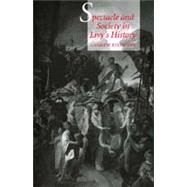
Spectacle and Society in Livy's History
by Feldherr, Andrew-

This Item Qualifies for Free Shipping!*
*Excludes marketplace orders.
Buy New
Rent Textbook
Used Textbook
We're Sorry
Sold Out
eTextbook
We're Sorry
Not Available
How Marketplace Works:
- This item is offered by an independent seller and not shipped from our warehouse
- Item details like edition and cover design may differ from our description; see seller's comments before ordering.
- Sellers much confirm and ship within two business days; otherwise, the order will be cancelled and refunded.
- Marketplace purchases cannot be returned to eCampus.com. Contact the seller directly for inquiries; if no response within two days, contact customer service.
- Additional shipping costs apply to Marketplace purchases. Review shipping costs at checkout.
Summary
Table of Contents
| Preface and Acknowledgments | |
| Abbreviations | |
| Vision and Authority in Livy's Narrative | p. 1 |
| Enargeia and the Political Function of Spectacle | p. 4 |
| Political Authority and the Representation of the Past in the Latin Historiographic Tradition | p. 19 |
| Avarice, Vision, and Restoration | p. 37 |
| Historian and Imperator | p. 51 |
| The Battle of Aquilonia (10.38-41) | p. 55 |
| Ad Deos Auctores: Imperium and the "Existence" of the Gods | p. 64 |
| Camillus the Historian | p. 78 |
| Duels and Devotiones | p. 82 |
| Devotio | p. 85 |
| Duels | p. 92 |
| Torque and Crow | p. 99 |
| The Duel of the Younger Torquatus | p. 105 |
| Sacrifice, Initiation, and the Construction of the Patria | p. 112 |
| The Boundaries of the Patria | p. 116 |
| The Horatii and the Curiatii | p. 123 |
| The Death of Horatia | p. 132 |
| Sacrifice and Perspective | p. 144 |
| Sacrifice and Imperium | p. 155 |
| The Alternative of Drama | p. 165 |
| The Stage and the State | p. 169 |
| The Dramatic Digression (7.2) | p. 178 |
| Tragedy and the Tarquins | p. 187 |
| Sacrifice and the Restoration of the Res Publica | p. 194 |
| Verginia | p. 203 |
| Tanaquil and the Accession of Servius Tullius | p. 212 |
| Epilogue | p. 218 |
| Bibliography | p. 227 |
| General Index | p. 239 |
| Index Locorum | p. 243 |
| Table of Contents provided by Blackwell. All Rights Reserved. |
An electronic version of this book is available through VitalSource.
This book is viewable on PC, Mac, iPhone, iPad, iPod Touch, and most smartphones.
By purchasing, you will be able to view this book online, as well as download it, for the chosen number of days.
Digital License
You are licensing a digital product for a set duration. Durations are set forth in the product description, with "Lifetime" typically meaning five (5) years of online access and permanent download to a supported device. All licenses are non-transferable.
More details can be found here.
A downloadable version of this book is available through the eCampus Reader or compatible Adobe readers.
Applications are available on iOS, Android, PC, Mac, and Windows Mobile platforms.
Please view the compatibility matrix prior to purchase.